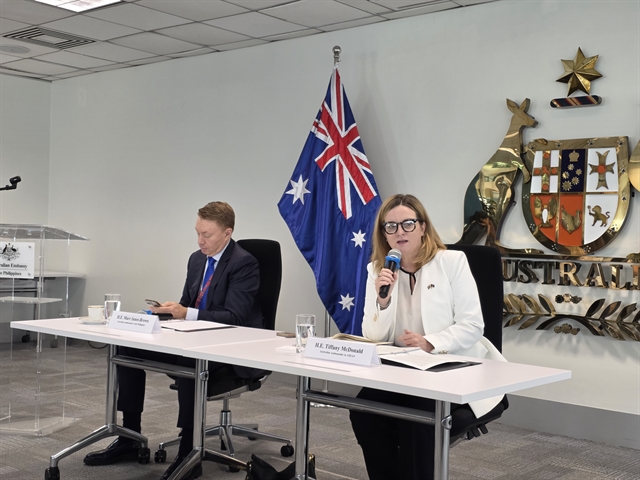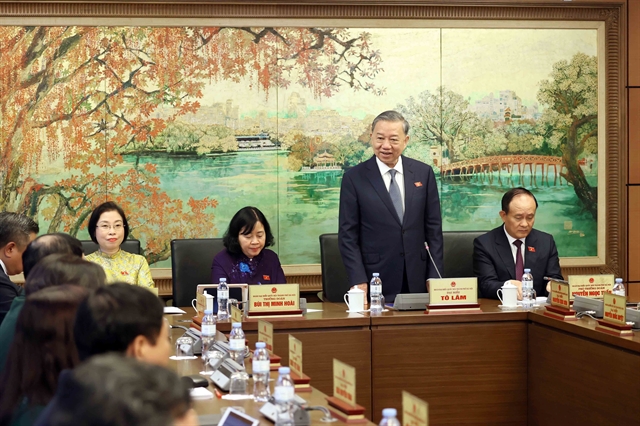 Politics & Law
Politics & Law

 |
| Chairman of the National Assembly Trần Thanh Mẫn speaks at the group discussions on amendments to the Constitution as the 15th-tenure parliament convenes 9th session in Hà Nội on May 5. — VNA/VNS Photo |
HÀ NỘI — The National Assembly spent the majority of the discussions on Monday on the amendment and supplementation of certain articles of the 2013 Constitution, and on the establishment of a Committee to draft these amendments.
This was the focus topic of the 37-day 9th session of the 15th-tenure parliament meeting that opened on Monday in Hà Nội.
NA Chairman Trần Thanh Mẫn during a group discussions stated that the proposed constitutional amendments had been carefully deliberated by the Politburo and the Party Central Committee on multiple occasions. He underscored that this was a matter of great importance and must be approached with caution, objectivity, democratic spirit, scientific reasoning, and effectiveness.
Specifically, the amendments would focus on 8 out of 120 articles, grouped into two main areas: provisions concerning the Việt Nam Fatherland Front and socio-political organisations, and provisions in Chapter IX of the 2013 Constitution relating to the two-tier local government model.
The proposed amendments are intended solely to support the continued implementation of the organisational streamlining revolution according to the spirit of Resolution No.18 of the Party Central Committee with regards to the continued reform and streamlining of the organisational structure of the political system, without extending into unrelated areas.
Chairman Mẫn stated that the NA will work to adopt a resolution on the amendments before June 30 this year, so that the resolution can start to enter effect starting July. This means that the government structure will be streamlined into two levels: provincial and communal. District-level administrations will be abolished across the country, and their functions and duties will be transferred to the commune-level in part, and to the provincial-level in part.
Starting from May 6, the NA will spend one month gathering public feedback on the constitutional amendments.
Regarding provincial-level mergers, it is expected that after the Government submits its proposal to the National Assembly, the matter will be debated in Parliament.
If approved, the number of provinces and centrally-run cities will be reduced by nearly half, down from 63 to 34.
The Politburo has also provided guidance on transitional provisions, allowing about a month and a half to ensure seamless, uninterrupted local government operations. The transition will follow a roadmap for the reorganisation and merger of provincial and communal-level administrative units, with no intermediate district level.
Given that the scope of the proposed constitutional amendments is limited—expected to affect only about 8 of the 120 articles of the 2013 Constitution—it has been proposed that the amendments be made through a Resolution of the National Assembly, Mẫn noted.
Lawmakers agreed on the necessity of the constitutional amendments, emphasising the need to institutionalise the Party’s guidelines on continuing to reform and streamline the political system’s organisational structure, making it leaner, stronger, more effective and efficient. The amendments will provide constitutional grounds for the restructuring of the Việt Nam Fatherland Front, socio-political organisations, and mass associations assigned tasks by the Party and the State, and for refining the two-tier local government model to bring it closer to the people and better serve them.
Deputy Sùng A Lềnh (representing the northern province of Lào Cai) stressed that amending and supplementing several articles of the 2013 Constitution demonstrates the NA’s proactive stance in response to major changes in the state apparatus and increasing demands for institutional reform.
He also strongly supported the approach of issuing a NA Resolution to amend the Constitution. “This approach aligns with international legal practices, is flexible, and ensures procedural rigour while avoiding disruption to the full text of the Constitution, given the relatively narrow scope of the amendments.”
Regarding the establishment of the Drafting Committee, Deputy Lềnh proposed assigning a lead body responsible for compiling, receiving, and explaining public, sectoral, and governmental feedback, as this stage is decisive in ensuring the quality and consensus of the amendments.
He also called for regular reporting on progress, enabling the NA to closely monitor the drafting process. “The Constitution is the fundamental law, the legal cornerstone. Any amendments must be considered with the utmost care and prudence, while also ensuring they are timely so as not to miss the momentum of institutional reform.”
 |
| General Secretary Tô Lâm speaks at the group discussions on amendments to the Constitution as the 15th-tenure parliament convenes 9th session in Hà Nội on May 5. — VNA/VNS Photo |
Speaking during the group discussions, General Secretary Tô Lâm emphasised that this session of the NA involves numerous critical agenda items, among which the proposed amendments to the Constitution must strictly follow legal processes and procedures, and be subject to broad-based public consultation. The General Secretary acknowledged that the responsible agencies had made very thorough preparations.
Party leader Tô Lâm remarked that Việt Nam is simultaneously undertaking a great many tasks—particularly streamlining and restructuring the state apparatus—while still ensuring the smooth continuation of routine functions and sustaining socio-economic growth. He noted that the Government had recently convened a meeting to review the country’s performance in the first four months of 2025, which showed encouraging indicators: revenue collection and the growth of production and business sectors were relatively strong amid many challenges.
He went on to affirm that socio-economic development remains a paramount task. For the country to progress, it must prioritise this objective in order to generate resources for investment and development—alongside advancements in culture, education, and healthcare, the top Vietnamese leader told the deputies.
The Party chief also underscored the need to continually improve the lives of the people. As the country develops, its citizens must directly benefit from the fruits of that progress, which would lay a strong foundation for the next stage of national development.— VNS




